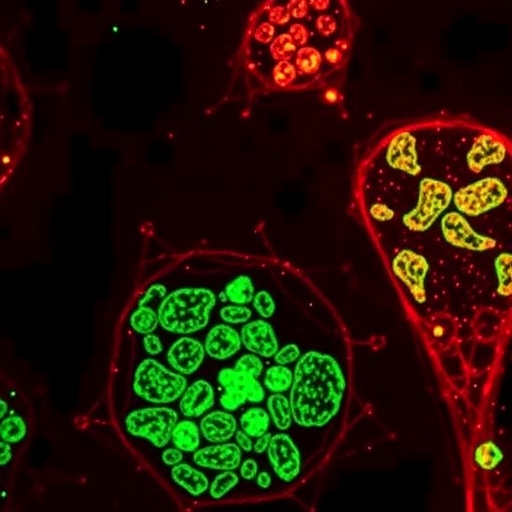In the complex realm of cancer biology, understanding the intricate pathways that lead to tumorigenesis is crucial for developing innovative therapeutic strategies. A recent study has illuminated the pivotal role played by the transcription factor PATZ1 in not only tumor development but also in the regulation of metabolic processes. The findings, published in the Journal of Cancer Research and Clinical Oncology, provide an in-depth exploration of how PATZ1 contributes to the malignant phenotype of various cancers.
The study begins by contextualizing PATZ1 within the grander narrative of cancer biology. Transcription factors like PATZ1 are proteins that bind to specific DNA sequences, regulating the expression of genes that are pivotal for cell growth, differentiation, and survival. Its aberrant expression and function have been increasingly implicated in both genetic and epigenetic alterations that characterize cancer cells. By modulating gene expression profiles, transcription factors like PATZ1 can either promote or inhibit cancer progression, making them prime targets for therapeutic intervention.
One of the groundbreaking revelations of this research is the dual role of PATZ1 in tumorigenesis and metabolic regulation. The authors demonstrated that PATZ1 enhances the expression of oncogenes while repressing tumor suppressor genes, creating an environment conducive to unchecked cell proliferation. This oncogenic function was observed across various cancer types, highlighting PATZ1’s potential as a universal biomarker for tumor aggressiveness.
Moving beyond the direct contributions to tumor growth, the study also uncovered how PATZ1 orchestrates metabolic pathways. In cancer cells, metabolism is often reprogrammed to support rapid proliferation and growth; thus, understanding how PATZ1 influences these metabolic networks is vital. The authors presented compelling evidence that PATZ1 affects the expression of genes involved in glycolysis and lipid metabolism, contributing to the metabolic reprogramming characteristic of tumor cells.
Significantly, the research identifies potential mechanisms by which PATZ1 alters metabolic states. For instance, PATZ1 was shown to interact with key metabolic transcription factors, thereby modulating their activity and influencing downstream metabolic processes. This crosstalk between tumorigenesis and metabolism underscores a fascinating aspect of cancer biology—namely, that metabolic dysregulation is not merely a consequence of cancer but can be a driver of malignancy.
As the authors delved deeper into the molecular mechanisms at play, they highlighted the relevance of PATZ1 in influencing the tumor microenvironment. The tumor microenvironment comprises various cell types and signaling molecules that can either promote or inhibit cancer progression. The study provides novel insights into how PATZ1 may be involved in shaping this microenvironment, revealing that PATZ1 can modulate the expression of cytokines and growth factors that influence tumor growth and immune evasion.
Another intriguing facet of the study is its implications for therapy. Given that PATZ1 plays critical roles in both tumorigenesis and metabolic regulation, targeting this transcription factor holds promise for developing novel cancer therapies. The authors proposed that inhibiting PATZ1 function could potentially disrupt cancer cell metabolism and reduce tumor viability. In this context, understanding the precise biological functions of PATZ1 opens up avenues for therapeutic strategies that could be tailored to individual tumors based on their PATZ1 expression levels.
Furthermore, the research paves the way for considering PATZ1 as a potential prognostic marker. The differential expression of PATZ1 in various cancer types may help stratify patients based on their risk of aggressive disease or response to therapies. This shift toward personalized medicine highlights the importance of understanding the underlying molecular mechanisms of cancer, which could significantly impact patient outcomes.
The findings underscore the need for further research aimed at elucidating the complete spectrum of PATZ1’s interactions and functions within cancer cells and the surrounding microenvironment. Addressing how PATZ1 is regulated itself is equally critical, as its upstream regulators could represent additional therapeutic targets. Epigenetic modifications, post-translational modifications, and interactions with other proteins warrant detailed investigation, as they could influence PATZ1’s activity and stability.
In conclusion, this study offers a comprehensive exploration of PATZ1’s role in cancer and metabolism. As research evolves, the insights gained from understanding PATZ1 may significantly impact our approach to diagnosis, therapy, and ultimately, the management of cancer. The growing body of evidence points to the potential of transcription factors like PATZ1 not only as critical players in tumor development but also as pivotal nodes in the intersection of cancer biology and metabolism.
Therapeutically, this underscores a paradigm shift where targeting transcription factors could provide a multifaceted approach to combatting cancer. By addressing tumor growth and altering metabolic processes simultaneously, it may be possible to develop holistic treatments that can better tackle the multifactorial nature of cancer.
As researchers continue to unpack the complexities of PATZ1, the hope is that it will serve as either a compelling therapeutic target or a reliable prognostic biomarker for various malignancies. The journey ahead remains challenging, but with studies like these illuminating the path, there’s a renewed sense of optimism in the fight against cancer.
Subject of Research: The role of the transcription factor PATZ1 in tumorigenesis and metabolic regulation.
Article Title: The role of the transcription factor PATZ1 in tumorigenesis and metabolic regulation.
Article References:
Zheng, Y., Chen, J. & Su, C. The role of the transcription factor PATZ1 in tumorigenesis and metabolic regulation.
J Cancer Res Clin Oncol 151, 254 (2025). https://doi.org/10.1007/s00432-025-06305-8
Image Credits: AI Generated
DOI:
Keywords: PATZ1, Tumorigenesis, Metabolic Regulation, Transcription Factor, Cancer Biology.




